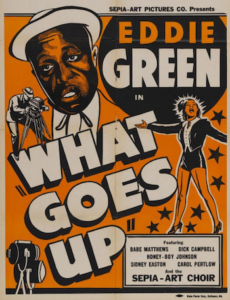
Stage Production Poster
*Dick Campbell was born on this date in 1903. He was a Black actor, theater advocate, and community activist.
Born Cornelius Coleridge Campbell in Beaumont, Texas. Orphaned at the age of six, he was raised by his maternal grandmother, Pauline Snow. He was a janitor at his local high school before attending Paul Quinn College in Waco, Texas. In 1926, after graduation, Campbell moved to Los Angeles to pursue a career as a performer. There he appeared as a singer and a straight man in a series of vaudeville shows. After two years, Campbell joined the touring Whitman Sisters' Show, which brought him to New York City.
Beginning in 1929, he regularly worked in various stage productions in Harlem and on Broadway. In June of that year, Campbell appeared in the Fats Waller musical revue Hot Chocolates, featuring a young Louis Armstrong in his Broadway debut. Campbell also appeared in Hot Rhythm, Singing the Blues, and Brain Sweat. The latter was a comedy that ran briefly on Broadway in 1934 and featured Rose McClendon in its cast.
Campbell married Muriel Rahn, a concert singer, in 1932. They were married until she died in 1961. They had three daughters: Diana Wilson, Paulette Wilson, and Patricia Wilson Campbell. Not satisfied with the number and range of roles available for Black actors, he and McClendon founded the Negro People's Theatre in 1935. A highlight of their Harlem-based company was the successful staging of an all-black production of Waiting for Lefty by Clifford Odets.
Two years later, after McClendon's death, Campbell and his wife founded the Rose McClendon Players. Their activities took place in the basement of the Mt. Morris Park Library, located at 9 West 124th Street in New York City. Under Campbell's direction, the Rose McClendon Players helped establish the careers of several Black artists, including Frederick O'Neal, Helen Martin, Edmund Cambridge, Loften Mitchell, and Abram Hill. The Rose McClendon Players initiated a policy of doing only plays written by black playwrights. During their five years of operations, they produced fifteen plays (including full-length and one-act works).
This included the initial production of Hill's 'On Striver's Row' before it premiered with the American Negro Theatre featuring Frederick O'Neal in the cast. Also, in 1937, Campbell joined actress Fredi Washington, actor Leigh Whipper, Noble Sissle, and W. C. Handy to form the Negro Actors Guild. While simultaneously serving as director of the Rose McClendon Players, Campbell was appointed director of the Harlem unit of the Federal Theater Project in 1939.
In 1942, the Army chose Campbell to produce Black USO camp shows. After the end of World War II, Campbell founded his talent agency, representing clients as Ossie Davis and Ruby Dee. He also served as executive director of the New World Symphony and helped found the Harlem Theater Workshop. Unhappy with the number and quality of roles offered by black actors, Campbell initiated a media campaign in the black press.
This was highlighted by a media boycott, in which he demanded that Blacks turn off their television sets on Saturday, February 26, 1955, to show their economic clout. This media boycott, commonly referred to as a "blackout," drew considerable attention. In the wake of the boycott, Campbell was asked to meet with various television executives, which increased opportunities for other actors, if not for him. Ossie Davis, who also appeared in Scandalize My Name, spoke about Campbell's boycott, "Based on that, Dick was sent for.
And he talked, negotiated, opened some doors, and got us some jobs. Of course, they never gave Dick a job." Campbell mounted his media campaign against discrimination in the entertainment industry during the height of McCarthyism and the HUAC. "I was blacklisted," Campbell said. In 1956, Campbell worked as a director and producer for the American National Theatre Association, a branch of the US Department of State. He served in that capacity until 1964, representing the US in Africa in the International Cultural Exchange Program.
In 1967, Campbell was appointed as assistant director of public affairs in the New York City Human Resources Administration under Mayor John Lindsay. He served as a spokesperson in support of the city's anti-poverty programs. Campbell continued criticizing theatre companies that did not hire Blacks on and off the stage. This included black theatre companies, especially those receiving large grants. In 1968, Campbell expressed outrage at the newly formed Negro Ensemble Company because, in their initial season, they lacked plays written by black playwrights, yet had just received a $450,000 grant from the Ford Foundation to support such work.
Later, he married Beryl Campbell; in 1972, they founded the Sickle Cell Disease Foundation of Greater New York together. He served as the organization's executive director until his death on December 20, 1994. He was 91 years old.